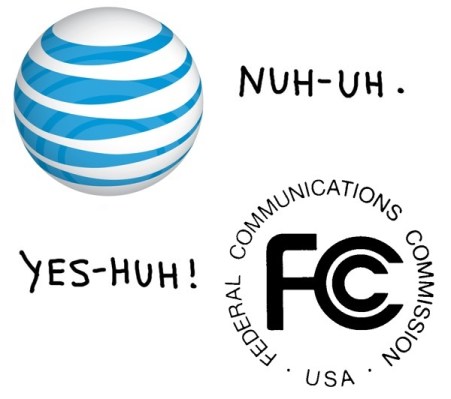So remember that staff report the FCC released a few days ago? It was basically a novella-length rant on how horrible the AT&T/T-Mobile merger would be, and how many of AT&T’s arguments were flawed. Releasing the document in the first place was a bit unorthodox, as AT&T had withdrawn its application before the FCC had opened the report up to the public.
The FCC offered up reasons for releasing it though, transparency being the most important one. Still, AT&T is seriously displeased with the alleged one-sidedness of the report, and has released its own lengthy response to the report’s findings:
We expected that the AT&T-T-Mobile transaction would receive careful, considered, and fair analysis. Unfortunately, the preliminary FCC Staff Analysis offers none of that. The document is so obviously one-sided that any fair-minded person reading it is left with the clear impression that it is an advocacy piece, and not a considered analysis.
In our view, the report raises questions as to whether its authors were predisposed. The report cherry-picks facts to support its views, and ignores facts that don’t. Where facts were lacking, the report speculates, with no basis, and then treats its own speculations as if they were fact. This is clearly not the fair and objective analysis to which any party is entitled, and which we have every right to expect.
All any company can properly ask when they present a matter to the government is a fair hearing and objective treatment based on factual findings. The FCC’s report makes clear that neither occurred on our merger, at least within the pages of this report. This has not been our past experience with the agency, which lets us hope for and expect better in the future.
AT&T then goes on to re-argue each of its original points that the FCC had so summarily shot down, including LTE expansion to 97 percent of Americans, job creation vs. job losses, and competition. According to AT&T, the report’s conclusion that AT&T will build out its LTE network to cover 97 percent of the U.S. population with or without the merger is false.
The report says this will occur because AT&T will be forced to do so by competition, despite documents and sworn declarations by AT&T to the contrary. To argue this, the report apparently assumes a high enough level of competition exists in rural areas to compel billions of dollars in investment. Yet the report elsewhere argues that the level of wireless competition in more populated areas of America is so fragile that the merger must be disallowed. At the very least, these conclusions show a logical inconsistency.
The blue carrier even brings up President Obama’s 2011 State of the Union Address, where he called deployment of mobile broadband to 98 percent of Americans an imperative. “It appears the FCC did not inform the President that in their view this was not a needed or worthy objective because it was apparently going to happen anyway,” said Jim Cicconi, AT&T senior executive VP of external & legislative affairs. Not the most pointed argument I’ve seen, but hey! Why not stir the pot?
AT&T also takes issue with the fact that the FCC has totally shot down its job creation claims. The report states that since AT&T will deploy its LTE network to 97 percent of the population anyway (with or without T-Mobile), it will yield no new jobs.
Yet, just two weeks ago the FCC announced that its new $4.5 billion broadband fund, which will help to deploy wireline broadband to a much smaller number of Americans–7 million– over the same time period, will create “approximately 500,000 jobs and $50 billion in economic growth over this period.” This notion — that government spending on broadband deployment creates jobs and economic growth, but private investment does not—makes no sense. Conversely, if the FCC had applied to its own broadband fund the same analysis it used for our merger-related investments, the result would be similar—zero new broadband, zero jobs, zero growth.
What’s interesting is that AT&T has plans to try, try again to acquire T-Mobile. Still, it sees no harm in basically waging war against the FCC over this report. The FCC itself has said that report is meant to be an informal analysis of the deal, yet releasing it certainly hurts AT&T’s future hopes of buying T-Mobile. Either way, calling out FCC officials as being questionably “predisposed” against the merger is a serious accusation, and one that’s not likely going to go over well in the FCC offices.
